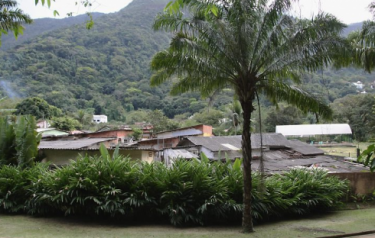Rio de Janeiro Botanical Garden, “one of the most beautiful and best preserved green areas in the city”, has been under political and social discussion between the Government and families that live within the area. Today, besides the old legal fight about the ownership of the land, Rio de Janeiro's City hall is studying a bill that intends to assure a homestead for the families.
The garden was founded in June 13, 1808 by the Regent Prince at the time, D. João VI, with the main purpose to acclimate spices brought from the East via Portugal, former colonizer of Brazil until 1822. Fascinated by the nature´s exuberance, D. João VI installed the garden aiming to increase the production of valuable goods. In October 11th the same year, it was renamed to Royal Garden, and it was designated as a biosphere reserve by UNESCO in 1992. Nowadays it has an important research institute [pt] which is responsible for environmental scientific studies as well as the conservation of 82 hectares of rainforest in the city. The Institute's website has an interesting iconographic collection with 19th century pictures and paintings of the Botanical Garden.
Living in a Biosphere Reserve Garden
According to the Residents and Friends of the Garden Association [AMAHOR, pt], the Botanical Garden has had residents since the beginning of the 19th century, when houses were built for the workers of a gunpowder factory. A few decades after the factory ceased activities there, in the 20th century Botanical Garden workers were authorized to establish residence within the area. Nowadays the natural protected area is home to almost 600 families, even though the Government has been trying to remove the families from there since the 80s.
AMAHOR weaves a series of historical considerations that suggest the area should become a “Social Area of Special Interest” [AEIS, pt], as it is justified in the draft law of bill 161/2009. They believe that it is a “human rights issue” and that the “permanence of the families in the Garden, where they grew up and built ties, represents memories that simply can not be erased by a forced removal”. Therefore, they want to assure that the community has the right to legalization of the occupied lands and gets urban infrastructures, such as water supplies, to improve the neighborhood.
That is also what one of the authors of the bill, alderman Eliomar Coelho, says in his blog. He states that part of the community living there descends from old workers who inherited the houses and who have been fighting to protect the garden, namely from exploitation by big corporations that could deteriorate the Botanical Garden [pt]:
A questão é que estas famílias ocupam áreas que pertencem à União e padecem do iminente risco de despejo motivado por ações de reintegração de posse promovidas pela União Federal.
Movimento dos Trabalhadores Sem Teto [Homeless Workers Movement, pt] also supports the bill and launched a petition, as they explain:
A comunidade pleiteia a regularização através da CUEM – Contrato de Concessão de Uso para Fins de Moradia – ou da CDRU – Concessão de Direito Real de Uso – , pois estes são os instrumentos legítimos que nos auxiliarão a conter o avanço da especulação imobiliária que se utiliza da mídia e dos discursos preconceituosos para humilhar e criminalizar os moradores do Horto. Nossos direitos são respaldados pela Constituição Federal, pelo Estatuto da Cidade e pela Lei Orgânica do Município. Pela consolidação destes DIREITOS continuaremos a LUTAR incansavelmente, pois outras áreas da União estão sendo regularizadas de forma tranqüila, sem contestação da mídia ou da elite a qual esta mídia representa.
In response, a different association with a similar name to AMAHOR, Residents and Friends of the Botanical Garden [AMAJB, pt] is promoting another petition, this time against the bill 161/2009. They point out that the number of houses has increased and, if the bill is approved, the number of people living in that area will grow even more, thanks to the new services predicted in the AIES creation.
Many citizens feel aggrieved with the project, because the area belongs to the Government who has been unsuccessfully claiming the land for years, through lawsuits. Sonia Rabello, Urbanistic and Administrative Law Professor, discusses in her blog:
Moradia é um direito de todos. Não só dos que estão lá. Para isto é preciso políticas públicas consistentes e eficazes para sua produção. O Estado, a pretexto de regularizar aqui e ali não tem assumido o ônus de colocar o dedo na ferida, como temos publicado aqui. No caso do Jardim Botânico, o patrimônio é de todos os brasileiros, inclusive dos outros milhares de pobres que não souberam que podiam ocupar o local para ter futuro “direito” à moradia…
There is great discussion around this bill and around the consequences for the community that will be affected by the destiny of the Botanical Garden. A judicial evaluation of the situation is essential to guarantee the best for the community and for the Brazilian citizens.








